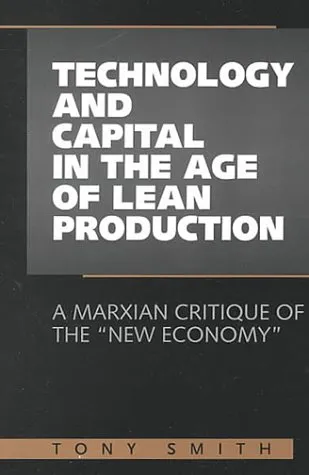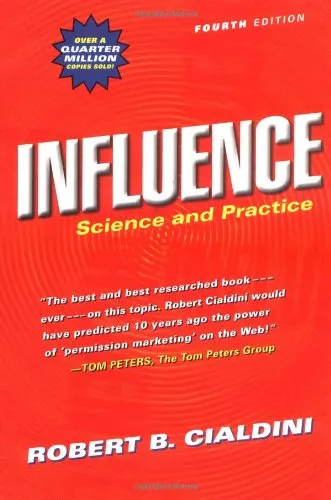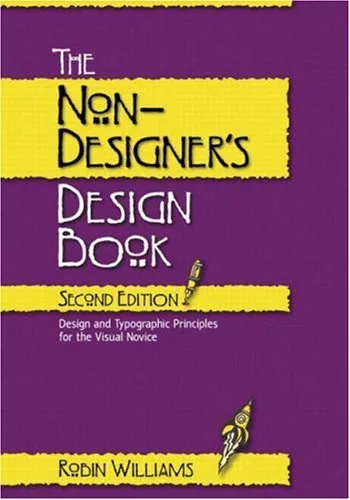Technology and Capital in the Age of Lean Production: A Marxian Critique of the "New Economy"
4.0
بر اساس نظر کاربران

شما میتونید سوالاتتون در باره کتاب رو از هوش مصنوعیش بعد از ورود بپرسید
هر دانلود یا پرسش از هوش مصنوعی 2 امتیاز لازم دارد، برای بدست آوردن امتیاز رایگان، به صفحه ی راهنمای امتیازات سر بزنید و یک سری کار ارزشمند انجام بدینکتاب های مرتبط:
مقدمهای بر کتاب "Technology and Capital in the Age of Lean Production: A Marxian Critique of the 'New Economy'"
کتاب "Technology and Capital in the Age of Lean Production" نوشتهی من، تونی اسمیت، تحلیلی دقیق از رابطه پیچیده تکنولوژی، سرمایه و فرآیندهای تولید در دوران اقتصاد ناب (Lean Production) ارائه میکند. این کتاب با تمرکز بر نقد مارکسیستی، مسئله "اقتصاد نوین" را بررسی کرده و چالشهای اقتصادی و اجتماعی ناشی از این مدل تولیدی را مورد مطالعه قرار میدهد.
خلاصهای از کتاب
این کتاب تلاش میکند تا پایههای نظری و عملی نظم تولید ناب را با تأکید بر تکنولوژیهای مدرن و شیوههای مدیریت سرمایه بررسی کند. از منظر مارکسیستی، تولید ناب تنها تحولی در روشهای مدیریت تولید نیست، بلکه ابزاری است برای افزایش استخراج ارزش اضافی از نیروی کار انسانی. در این اثر، من به این پرداختهام که چگونه تحول در فناوری و تکنولوژی نه تنها باعث بهرهوری بیشتر بلکه موجب عمقبخشیدن به تضادهای سرمایهداری شده است.
کتاب در چهار بخش اصلی موضوعاتی مانند نقش تکنولوژی، تسلط سرمایه بر کارگران، تغییرات در روابط طبقاتی و انعکاس این تحولات در ساختار اجتماعی را تحلیل میکند. یکی دیگر از مباحث محوری آثار من در این کتاب، تأکید بر افزایش نابرابریها و بحرانهای اجتماعی در نتیجهی این تحولات است. دنیای "New Economy" در ظاهر فرصتی برای سرعت و دقت بیشتر در تولید است، اما در نهایت، معضلات ساختاری سرمایهداری کلاسیک همچنان پابرجا میمانند.
نکات کلیدی کتاب
- نقدی عمیق بر تولید ناب از دیدگاه تئوری مارکسیسم.
- بررسی تأثیر فناوریهای نوین، مانند سیستمهای مدیریت داده و ابزارهای خودکار، بر اقتصاد جهانی.
- تحلیل استمرار استثمار ناشی از مناسبات سرمایه و کار در اقتصاد نوین.
- ارتباط میان تولید ناب و شدتیافتن بحرانهای اجتماعی، اقتصادی و زیستمحیطی.
- بازبینی مفهوم ارزش اضافی (Surplus Value) در عصر تکنولوژی پیشرفته.
جملات مشهور از کتاب
"تکنولوژی نه تنها ابزار کار کردن، بلکه مشخصکننده رابطه انسان و سرمایه است."
"صنعت ناب وعدهی بهرهوری بیشتر میدهد، اما تحت سیطرهی سرمایهداری، بیش از هر زمان دیگری نیروی کار انسانی را فرسوده میکند."
"خلاقترین فناوریها، اگر در بستر سرمایهداری گسترش یابند، تنها ابزارهایی برای تقویت تضادها خواهند بود."
چرا این کتاب اهمیت دارد؟
کتاب "Technology and Capital in the Age of Lean Production" پاسخی ضروری به سوالات اساسی درباره نقش فناوری در سرمایهداری مدرن است. این کتاب بهویژه برای کسانی که مایل به درک عمیقتری از رابطه بین نیروی کار انسانی، سرمایه و تکنولوژی هستند، اهمیت ویژهای دارد. با توجه به تأثیر گسترده تولید ناب در صنایع جهانی، شناخت کامل این سیستم تولیدی و پیامدهای اجتماعی و اقتصادی آن یک گام اساسی در نقد سیاستهای اقتصادی معاصر تلقی میشود. این کتاب نه تنها ابزاری برای فهم بهتر نظامهای اقتصادی است، بلکه دیدگاه مارکسیستی نوینی را نیز برای درک آینده اقتصاد جهانی ارائه میدهد.
خوانندگان این کتاب در مییابند که چگونه تکنولوژیهای مدرن، باوجود تمام وعدههایشان، همچنان در چارچوب محدودیتهای اقتصاد سرمایهداری به کار گرفته میشوند، و در نهایت بحرانهایی نظیر نابرابری و بیثباتی را تشدید میکنند.
Introduction to "Technology and Capital in the Age of Lean Production: A Marxian Critique of the 'New Economy'"
"Technology and Capital in the Age of Lean Production: A Marxian Critique of the 'New Economy'" is a thought-provoking exploration of how technological advancements have shaped the trajectory of capitalism in the contemporary era often referred to as the "New Economy." This book critiques the widespread adoption of lean production techniques, investigates their implications for labor conditions, and challenges the notion that technological innovation inherently leads to progress under capitalism. Grounded in Marxian theory, it unveils the contradictions and limitations of lean production systems, offering a compelling framework to critically engage with the globalized capitalistic economy.
Detailed Summary of the Book
The book begins with a historical overview of lean production, a methodology that originated in the manufacturing industry, particularly within Toyota’s production system. These techniques emphasize efficiency by reducing waste, utilizing just-in-time production, and maximizing labor productivity. While lean production has often been celebrated as the "next big thing" for modern industry, this book highlights how such approaches are not merely technical fixes but are deeply intertwined with the logic of capital accumulation.
Drawing from Marxian economics, the book argues that lean production is not a neutral advancement in productivity but a strategy to extract surplus value more intensively from workers. It critically examines how the implementation of lean production exacerbates the pressures on labor, increasing job insecurity, demanding greater flexibility, and intensifying workloads. It reveals that while lean production may seem like a win-win scenario for businesses and consumers, the cost borne by workers and the broader social implications of such practices are often omitted from the dominant narrative.
The book also interrogates the concept of the "New Economy," a phrase often used to describe our world of globalization, high technology, and knowledge-based production. It questions whether this new paradigm genuinely represents a rupture from traditional capitalism or if it merely serves as a continuation of old exploitative patterns in new technological guises. Through detailed case studies and rigorous theoretical analysis, the book explores how technology is weaponized by capital not to liberate labor but to deepen its subordination to profit-making imperatives.
Key Takeaways
- Lean production is not inherently progressive; it reflects the underlying dynamics of capital seeking to boost profit margins.
- Technology under capitalism serves dual purposes—it advances productivity but also deepens labor exploitation.
- The "New Economy" is not a break from historical capitalist patterns but a reconfiguration of old structures driven by technological tools.
- Marxian theory provides a critical vantage point to understand the contradictions between technological potential and societal outcomes under capitalism.
- Real progress requires a rethinking of the structures of production beyond the confines of capital accumulation.
Famous Quotes from the Book
"Efforts to maximize efficiency in production systems often reveal themselves to be instruments of maximizing the intensity of labor exploitation."
"What is taken as progress in the age of the New Economy is often little more than the reconfiguration of oppression through technological sophistication."
"We must ask not just how technology advances productivity, but whose interests are served by such advancements."
Why This Book Matters
This book is essential for anyone seeking to understand the intersection of technology, labor, and capitalism in today’s global economy. In a world increasingly dominated by automation, artificial intelligence, and gig economies, we are witnessing profound transformations in how work is structured and valued. Yet, these changes are too often celebrated uncritically. "Technology and Capital in the Age of Lean Production" cuts through the celebratory narratives and exposes the institutionalized inequalities that persist, demonstrating why it is vital to approach these developments through a critical lens.
For students of political economy, labor studies, history, and social theory, this book provides a robust theoretical framework rooted in Marxian critique. It reminds us that technological development is not inherently liberatory; its effects depend on the socio-economic system in which it is embedded. Understanding these dynamics is crucial for envisioning a future that prioritizes human needs over profit motives.
By dissecting the myths surrounding the New Economy and lean production, this book equips readers not just with a critique but with tools to imagine alternatives to the capitalist mode of production. It challenges the reader to rethink the role of technology in society and to advocate for structures that align technological progress with social equity and justice.
دانلود رایگان مستقیم
شما میتونید سوالاتتون در باره کتاب رو از هوش مصنوعیش بعد از ورود بپرسید
دسترسی به کتابها از طریق پلتفرمهای قانونی و کتابخانههای عمومی نه تنها از حقوق نویسندگان و ناشران حمایت میکند، بلکه به پایداری فرهنگ کتابخوانی نیز کمک میرساند. پیش از دانلود، لحظهای به بررسی این گزینهها فکر کنید.
این کتاب رو در پلتفرم های دیگه ببینید
WorldCat به شما کمک میکنه تا کتاب ها رو در کتابخانه های سراسر دنیا پیدا کنید
امتیازها، نظرات تخصصی و صحبت ها درباره کتاب را در Goodreads ببینید
کتابهای کمیاب یا دست دوم را در AbeBooks پیدا کنید و بخرید
1286
بازدید4.0
امتیاز0
نظر98%
رضایتنظرات:
4.0
بر اساس 0 نظر کاربران
Questions & Answers
Ask questions about this book or help others by answering
No questions yet. Be the first to ask!














